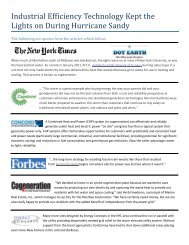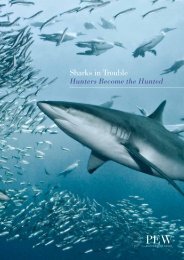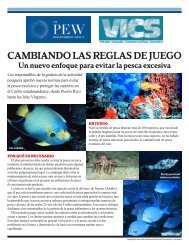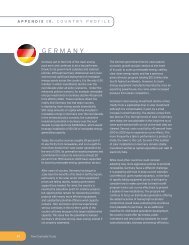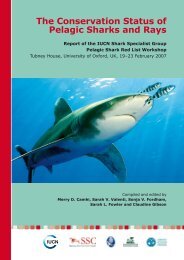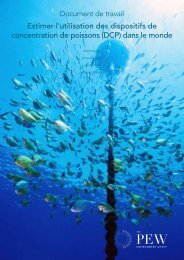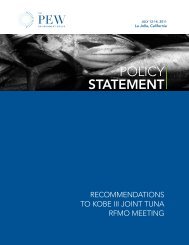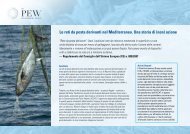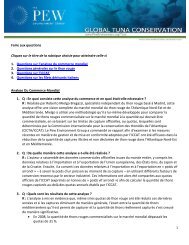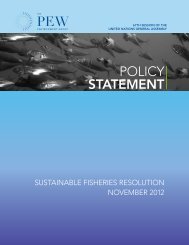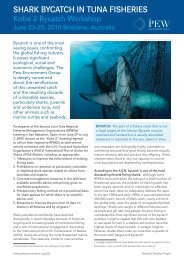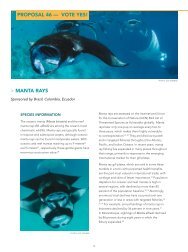The Law That's Saving American Fisheries - Ocean Conservancy
The Law That's Saving American Fisheries - Ocean Conservancy
The Law That's Saving American Fisheries - Ocean Conservancy
You also want an ePaper? Increase the reach of your titles
YUMPU automatically turns print PDFs into web optimized ePapers that Google loves.
fisheries. <strong>The</strong> idea has caught on: More than 80 similar<br />
initiatives have sprouted in fishing ports around<br />
the country.<br />
Selectively capturing and marketing the long-forgotten<br />
Acadian redfish, which has finally rebounded to healthy<br />
population levels, decades after the stock collapsed<br />
under industrial fishing pressure.<br />
<strong>The</strong>se and other innovations became necessary in 2008, when<br />
the cost of diesel fuel reached record highs, climbing above<br />
$4 per gallon. “I was hammered by high fuel and low fish<br />
prices and ended up having to sell my federal fisheries permit<br />
to help the family business get out of debt,” says Libby. He<br />
and other vessel owners teamed up with researchers to test<br />
whether larger-mesh and lighter netting would reduce drag<br />
and save fuel. It did: Field trials showed fuel savings of 20<br />
percent to 30 percent. Libby says his son Justin’s fuel records<br />
indicate a reduction of 30 percent, which saves about $100 a<br />
day. In addition, the larger mesh reduces bycatch, especially<br />
of juvenile fish.<br />
Another improvement was the switch from fishing under<br />
“days-at-sea” rules—a cap on the number of days that fishermen<br />
could fish—to community-based sector management,<br />
Libby reports. “Under the old rules, the clock was always<br />
ticking,” he says. “You had to get to the [fishing] grounds<br />
as quickly as possible and catch as many fish as fast as you<br />
could, which meant heavier gear, more discards, and more fuel<br />
burned. Now fishermen can run the engines easier, use flow<br />
meters, and save fuel. One big difference from days at sea is<br />
that now we have time to be innovative, to experiment, to try<br />
things that will help us survive. We’re taking fewer fish, but<br />
they’re higher quality, and we are making more money with<br />
less effort and less effect on the environment.”<br />
To ease the pinch of bycatch limits, the association is<br />
establishing a risk pool. Although such pools are new to<br />
New England, they have proved successful in the West<br />
Coast groundfishery. “Without the risk pool, one bad tow or<br />
catching only one of a critical species could mean the fisherman<br />
would have to buy more expensive quota or tie up for<br />
the rest of the season,” says Ben Martens, executive director<br />
of the Maine Coast Fishermen’s Association and manager of<br />
the sector.<br />
“We’re taking fewer fish, but they’re<br />
higher quality, and we are making more<br />
money with less effort and less effect on<br />
the environment.”<br />
— Glen Libby<br />
To make the most of what it can catch, Port Clyde’s fleet has<br />
ventured into new fishing methods and marketing initiatives.<br />
“<strong>The</strong>y’re building pieces of their business around methods<br />
and target fish they never considered before, like using jigging<br />
machines for redfish or catching and selling sculpin, dogfish,<br />
or skates,” says Martens. “We’re turning what used to be waste<br />
into a resource.”<br />
Some association members have a processing and marketing<br />
operation, Port Clyde Fresh Catch, and it is prospering. Libby,<br />
who oversees it, says: “We’re running about 30 percent above<br />
where we were last year at this time. We’re buying all sorts of<br />
species, including squid and rock, snow, spider, and Jonah crab;<br />
we sell cracked claws. We’re able to take in product that had<br />
no market or value a couple of years ago. Now local chefs<br />
love experimenting with underused species.”<br />
Libby adds: “Local fishermen gain by being able to sell their<br />
catch in Port Clyde. By not going to auction in Portland,<br />
they save on trucking, auction fees, shrinkage allowance, and<br />
brokers. That amounts to about 25 cents not deducted from<br />
the $1.50 a pound they get for hake, for example, and the<br />
savings are higher with higher-priced fish.”<br />
<strong>The</strong> community of Port Clyde continues<br />
a long tradition of fishing in Maine.<br />
MidCOAST Chamber Council,<br />
www.MainesMidCOAST.COM<br />
26 It’s a Keeper



